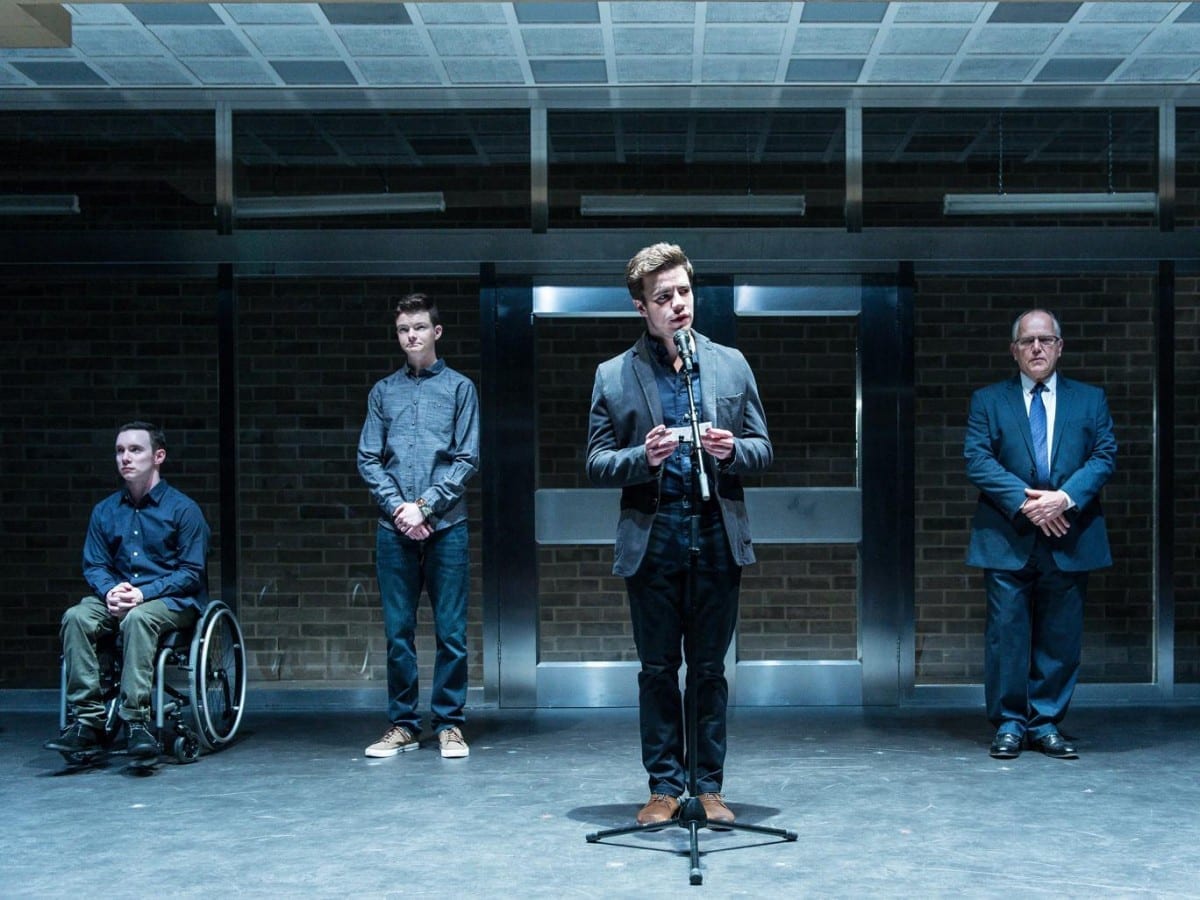Teddy Ferrara is a play that refuses to fall into complacency regarding LGBT equality. It is a play that repeatedly brings up issues that are often pushed under the carpet in favour of celebrating marriage equality with rainbow flags on Facebook. However, what it fails to do, throughout the production, is fully connect with these issues on an emotional level.
The play opens with the aftermath of a meeting of the queer student group with Gabe (Luke Newberry) discussing queer and student politics with boyfriend Drew (the excellent Oliver Johnstone) until they are interrupted by Teddy (a wonderfully awkward Ryan McParland). Throughout the first act Teddy interrupts at the worst possible times – including once mid-make-out, and although Gabe never fully ignores him, he never fully engages with him either, too caught up in furthering his political career to take note of the very real lives around him. None of the characters in Teddy Ferrara are particularly easy to warm to, despite the obvious difficulties they have faced, and once Gabe has referred to the fidgeting Teddy as “that” it is hard to feel very sorry for him at all. This is not necessarily a problem in and of itself – characters do not have to be likable to be engaging, after all – but the problem of likability is one that persists throughout. The most politically outspoken characters – Ellen and Jaq (Pamela Nomvete and Griffyn Gilligan) – are painted in broad brushstrokes, meaning the realities of the issues they are fighting for are inadvertently turned into half-comic buzzwords.
When they come, the moments of real emotional vulnerability are the strongest parts of the play. Teddy watches events unfold from the side-lines, physically skirting the edges of the play. Teddy reaches out to the internet for affirmation, his cam shows acting like half-hysterical soliloquies that juxtapose sharply with Drew and Gabe’s disintegrating togetherness. Drew, despite his initial bravado, is hollow-eyed and visibly hurting through much of the second act. His attempts to turn personal tragedy into social change fail, and he stands by the blustering University President’s side (Matthew Marsh) as he offers up empty platitudes. In a play where the personal is constantly wrestling the political for space, for ownership of these individual’s lives, it feels like a loss. It is frustrating, and perhaps this echoes the real life frustration of those seeking to implement real change – but it is not enough.
There is very little set in the play – much of the action takes place on the stark black floor. At its best, this creates a sense of focus on the lives playing out in isolated, almost hostile environments, and the moments where one or two characters allow themselves simply to exist in that space offer a brief respite from the rhetoric. Teddy Ferrara’s main problem is that it is simply too much. It offers us real problems, problems that affect countless of people around the world, and, despite the traumatic events of the play, it does not let us grasp the weight of pain behind that. Teddy’s final moments – a single spotlight above frozen, unaware dancers – are rushed past. It is a conclusion that we have been sleepwalking towards, a predictable end to the Act, and yet, when it comes, it is horrifying – at least, it is horrifying for a moment, before we are thrust into the world of immediate reaction, of immediate political reaction. So much of the problem in this play is that moments are not left to simply be – they are immediately thrown out for discussion and debate, and so the effect is lost.
Ultimately, despite all that it has said, Teddy Ferrara feels inconclusive, almost unfinished. It is an important work, a work that raises vital issues, but it is not a work that allows you to simply feel.

